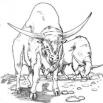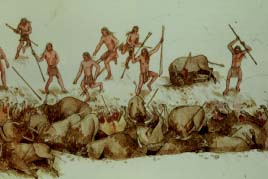
An Ice Age Mediterranean Scene as it may have appeared.
Human civilization is a direct consequence of the melt down of the Ice Age and flooding of the Mediterranean Basin.
The melt down of the last great Ice Age set in motion evolutionary forces that resulted in the development of human civilization. The Ice Age didn't simply melt down; it collapsed. Compared to the build up phase of the Ice Age, the melt down was sudden and swift. In some parts of the world, it was an ecological disaster. Our ancestors' Stone Age economies crashed. Those who survived were the ones who adopted agriculture and animal husbandry to replace their hunting and gathering economies. That was the beginning of "civilization."
The sun shining on warm equatorial oceans lifts water vapor high up into the atmosphere. Air currents carry large amounts of that water vapor to cooler latitudes away from the equator. Some of that moisture remains in the coldest latitudes in the form of ice and frost. During the last great Ice Age, that process lowered sea level of the world oceans to 120 meters below present sea level.
That build up process of the Ice Age is well understood. The causes of the melt down of the Ice Age are not so well understood. There are numerous "greenhouse" theories that attempt to explain the melt down. Atmospheric CO2 appears as the main "culprit" in most of those theories. However, no carbon cycle theory is adequately able to explain how a CO2 greenhouse occurred that was capable of melting the polar ice caps and vast regions of permafrost in northern latitudes. The cause of the melt down of the Ice Age is still a matter of conjecture and discussion.
Regardless of what caused the Ice Age to melt down, it happened very quickly. In North America, run-off water from the melt down may have gouged out the Grand Canyon in a few short centuries. During the long build up phase of the Ice Age, plants and animals were able to adapt to their slowly changing environment. The swiftness of the melt down caused many species to scramble for their survival. In regard to human evolution, the effects of the melt down were most significant in the lands surrounding the Mediterranean Sea.

 North America is a continent surrounded by oceans. During the Ice Age, there were very few people living on the North American continent. As the Ice Age melted down, sea level rose and the glaciers retreated. As the seas rose, animals and people who occupied the coastal plains retreated inland away from the flood. The seasonal grazing lands of vast herds of bison and other animals were lost. Mammoths and the largest species of American bison went extinct. At about that time, the large Clovis point tools of mammoth hunters disappeared and the smaller Folsom tools of bison hunters became the predominant type.
North America is a continent surrounded by oceans. During the Ice Age, there were very few people living on the North American continent. As the Ice Age melted down, sea level rose and the glaciers retreated. As the seas rose, animals and people who occupied the coastal plains retreated inland away from the flood. The seasonal grazing lands of vast herds of bison and other animals were lost. Mammoths and the largest species of American bison went extinct. At about that time, the large Clovis point tools of mammoth hunters disappeared and the smaller Folsom tools of bison hunters became the predominant type.
 The effect on humans was only minimal. They had to work a little harder to survive. They had to hunt larger numbers of smaller animals. The smaller animals and the smaller species of bison were able to survive the change. The humans were able to maintain their hunting and gathering way of life. A hunting and gathering economy requires a large area to support a small population. Following the melt down of the Ice Age, there was plenty or room left on the continent, and plenty of game, to support the few humans who were living in North America.
The effect on humans was only minimal. They had to work a little harder to survive. They had to hunt larger numbers of smaller animals. The smaller animals and the smaller species of bison were able to survive the change. The humans were able to maintain their hunting and gathering way of life. A hunting and gathering economy requires a large area to support a small population. Following the melt down of the Ice Age, there was plenty or room left on the continent, and plenty of game, to support the few humans who were living in North America.
The Mediterranean Basin is a sea surrounded by continents. It is a flooded valley. Rising sea level in the Mediterranean had more effect on the humans living in that confined valley than it had on people living on the North American continent. The rising Mediterranean flooded millions of acres of coastal plains that were the grazing lands of vast herds of herbivores and home to numerous other species, including humans.
Densely forested Western Europe was thinly populated. The winters were severe. Game was seasonal. Travel was difficult. Under those conditions, their hunting and gathering economy was capable of supporting only a few people in a large area. Modern demographers have estimated that the Ice Age population of England and Wales in total amounted to 2500 people living in tiny isolated family groups. The melt down of the Ice Age was probably beneficial to the people of Western Europe.
The Mediterranean Valley was a vast fertile plain of grassland and marshes. That fertile valley with its abundant wildlife and benevolent climate supported many tribes of our ancestors who probably lived lifestyles similar to the lifestyles of the Indians of North America. However, the Mediterranean Valley was far more heavily populated than was North America.
The rising Mediterranean drove those people out of the valley, up the into river valleys, and out onto the grassy plains of Eastern Europe and Eurasia. Those lands were already populated to the full capacity that the hunting and gathering economies there were able to sustain. Numerous wars broke out between indigenous populations and refugees from the flood. Some groups of refugees clashed with others.
The melt down of the Ice Age caused mass migrations of people. Those migrations compressed large populations of people with diverse cultures and many languages into a far smaller area than they had formerly occupied. The processes of love and war created whole new cultures in that melting pot. Some groups combined; others were eliminated. As in the American experience, that melding of cultures and combining of energies created new technologies.
Agriculture, animal husbandry, and urban living are technological developments that resulted from the flooding of the Mediterranean Basin. It didn't happen in North America. It didn't happen in Asia. It didn't happen in Africa. "Civilization" is a direct consequence of the melt down of the Ice Age flooding the Mediterranean Basin.
In the aftermath of the meltdown, a period of war, upheaval, experimentation and innovation occurred. Out of that period of struggle and turmoil, a great enlightened leader arose. That was Assur. Assur and his descendants established the first kingdoms on earth after the Flood.
|
Reader responses are invited. |
Return to Home Page . . . Return to Table of Contents Hub
Links to related topic pages:
The First Kingdom . . . Sunwing